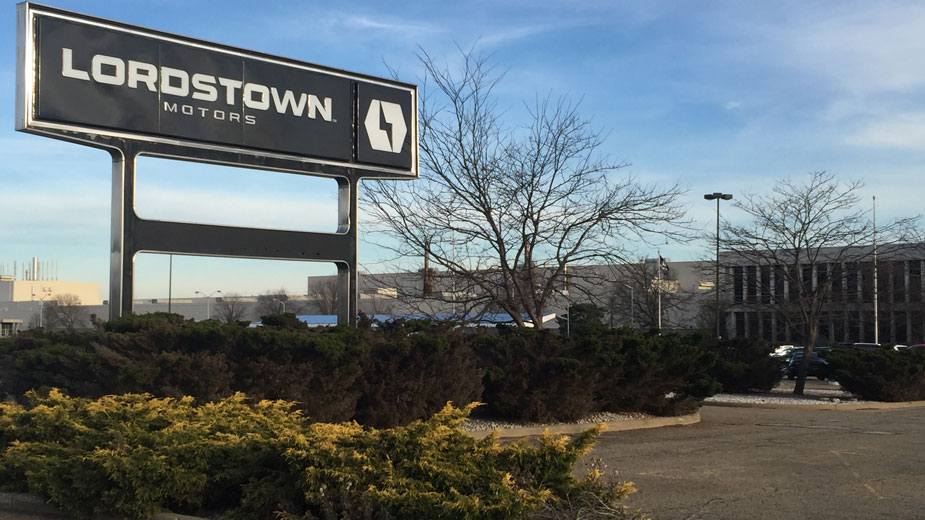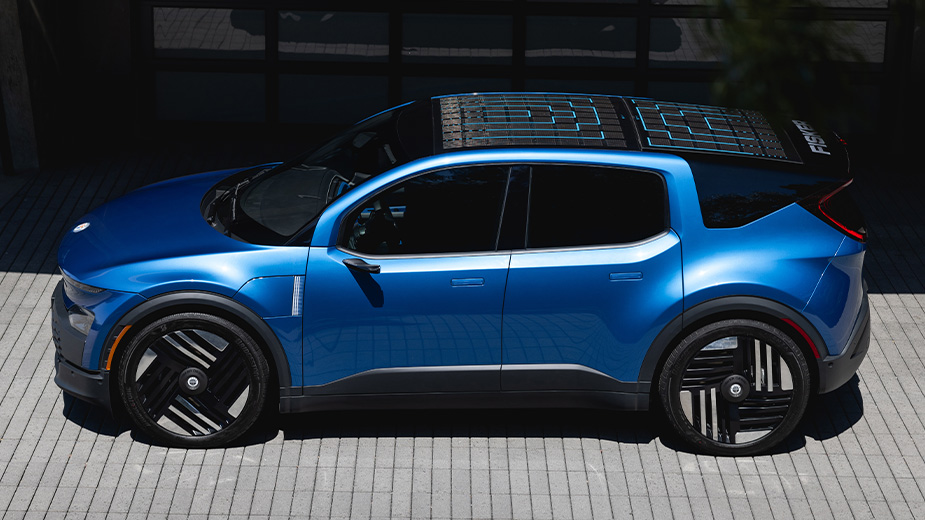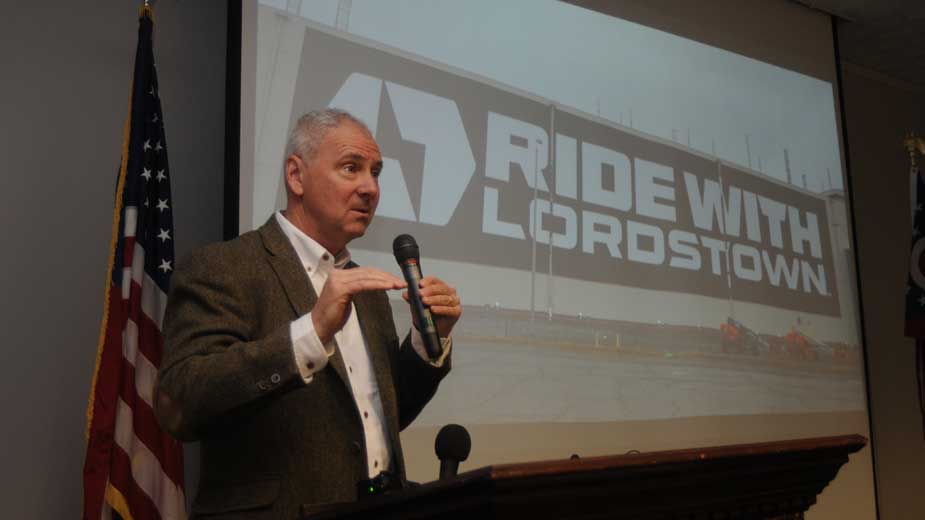Clock Ticking on Foxconn Deal
LORDSTOWN, Ohio – A proposed partnership between Lordstown Motors Corp. and Taiwanese technology giant Foxconn is still on the ropes, as the clock ticks toward a deadline of April 30 to reach a make-or-break deal for the local electric-vehicle startup.
Meanwhile, Lordstown Motors’ share value continues to falter after the company released its year-end financials and production forecast Feb. 28, dimming confidence in its future among analysts and the market.
If that isn’t enough, Lordstown Motors’ former CEO Steve Burns – the company’s largest single shareholder who resigned in June – cashed out more than $19 million worth of stock in the days following the annual report. These events were further compounded by confirmation from General Motors that it has unloaded all of its shares of Lordstown Motors.
The fallout from that volatile week is still reverberating. On March 8, Lordstown Motors’ stock, which trades under the ticker symbol RIDE, dipped below $2 per share for the first time to an all-time low of $1.99.
Morgan Stanley said the following day it would discontinue coverage of Lordstown Motors. In October, the investment bank downgraded RIDE to the equivalent of a “sell” rating.
FOXCONN DEAL
Much of the market’s pessimism stems from uncertainty over the proposed agreement with Foxconn and whether a deal can be reached at all. Lordstown Motors announced in November that it had reached an asset purchase agreement with the Taiwanese company in which Foxconn would purchase Lordstown’s assembly plant for $230 million and invest another $50 million in equity.
That deal, however, is contingent upon both parties arriving at a joint product development agreement in which Foxconn would manufacture future Lordstown Motors vehicles on Foxconn’s mobility in harmony – or MIH – platform.
“I am disappointed that we’re not further along,” Lordstown Motors CEO Daniel Ninivaggi told analysts during a conference call Feb. 28 to discuss 2021 year-end and fourth quarter financial results.
“The relationship with Foxconn is very positive and the discussions are ongoing, but we need to bring that to a conclusion,” he said.
A sticking point to the entire agreement appears to be whether Foxconn is willing to fund production of current and future Lordstown Motors vehicles in its MIH platform.

Lordstown is in the preproduction phase of its all-electric Endurance pickup and expects to begin limited deliveries of 500 vehicles during the third quarter. The company has also lowered its production goal for 2023 to just 2,500 vehicles.
While Ninivaggi said he remains confident that an agreement will be reached by April 30, the company needs to raise enough cash – about $250 million – to keep operations afloat for the rest of this year. Should the Foxconn deal fail to close, it could mean the end of Lordstown Motors.
Foxconn has made down payments totaling $150 million toward the purchase of the Lordstown plant and has invested another $50 million in equity. Under the agreement, Foxconn is to make a $50 million payment on April 15 and another $30 million at closing. Lordstown Motors in turn must keep a cash balance of at least $50 million on hand.
A TOUGH SPOT
Still, Lordstown’s need to raise more capital in the coming months is critical to its survival, according to regulatory filings.
“If we are unable to raise substantial additional capital in the near term, our operations and production plans will be scaled back or curtailed and, if any funds raised are insufficient to provide a bridge to full commercial production, our operations could be severely curtailed or cease entirely,” one document states.
Furthermore, the situation opens the door for Foxconn to potentially take possession of the 6.2 million square-foot plant and accompanying land without committing to a deal to manufacture Lordstown Motors vehicles. Foxconn last year announced an agreement with California-based Fisker Inc. to produce its Pear electric vehicle, preferably at the Lordstown plant.
Should the Foxconn agreement not close, Lordstown Motors is “unlikely to have sufficient available cash to repay Foxconn’s down payments,” the filing warns. “As a result, Foxconn may exercise its rights under the APA, including, but not limited to, foreclosing on its liens on some or substantially all of the company’s assets. Under such circumstances, we would not likely be able to continue as a going concern or realize any value from our assets.”
Ninivaggi told analysts that it’s “highly unlikely” the deal would fall through and that the company wasn’t at a point to seek other financing options.
But those options are limited as well.
Although the company has applied for a federally backed Advanced Technology Vehicles Manufacturing, or ATVM, loan, Lordstown Motors has yet to demonstrate solid financial resources and viability. These factors alone would disqualify it from tapping into any federal financing.
Moreover, an equity purchase agreement it signed with YA II in 2021 isn’t likely to yield enough capital to sustain Lordstown’s operations, given the rock-bottom share price RIDE is commanding.
“We are all in with Foxconn and we’re very confident we can make the relationship work,” Ninivaggi said.
“Clearly, we and Foxconn have more work to do.”
STOCK SELLOFF
Further compromising confidence in Lordstown Motors is former CEO Steve Burns selling off a huge chunk of his stock the same day the company released its earnings.
According to regulatory filings, Burns unloaded more than 7.7 million shares worth $19.6 million in two transactions dated Feb. 28 and March 2. This is in addition to his sale of 3.2 million shares in November that was then valued at $18.8 million.
Burns still holds 35.5 million – or 18% – of outstanding shares in the company, a stake worth an estimated $81 million, according to filings.
Burns resigned in June 2021 amid an internal investigation that determined executives made misstatements related to the volume of preorders of the Endurance. Julio Rodriguez, the chief financial officer, also resigned.
At the same time, early investors in Lordstown Motors have sold off their interests in the struggling company.
General Motors confirmed March 1 that it had sold off its 7.5 million shares during the fourth quarter at an undisclosed price.
GM sold its Lordstown Assembly Complex to Lordstown Motors in November 2019 for $20 million. To facilitate the sale, GM tendered an open-end mortgage of $50 million to Lordstown Motors that covered the purchase price and funds to start retooling the plant.
Once Lordstown Motors went public in October 2020, GM’s $50 million mortgage was converted into equity in the new venture. The Detroit automaker also added another $25 million in cash for a total of $75 million – or just less than 5% – stake in the company.
In November, Workhorse Group stated in a regulatory filing that it had sold off all of its equity in Lordstown Motors at a loss of more than $76 million. Workhorse, an electric-van manufacturer based near Cincinnati and also founded by Burns, was awarded a 10% stake in Lordstown Motors in exchange for specific technology used for the Endurance.
LEGAL BATTLES
Lordstown Motors also faces a barrage of legal issues that continues to mount.
Since October 2020, the company, its officials and its former officials, have been the subject of at least 17 lawsuits filed by other corporations or shareholders, according to regulatory filings.
California-based Karma Automotive has charged that Lordstown Motors committed “corporate espionage” and poached its employees to start a tech division in Irvine, Calif.
“The company is continuing to evaluate the matters asserted in the lawsuit, and is vigorously defending against Karma’s claims,” Lordstown Motors said in a regulatory filing.
Another company, DTE Lordstown, recently won a judgment in Trumbull County Common Pleas Court against Lordstown Motors for $2.5 million for breach of contract. That ruling is under appeal.
No less than 15 shareholder lawsuits have been filed against the company or its officials since March 2021.
The barrage began after short-seller Hindenburg Research published a report that accused Lordstown officials of “faking” preorders of the Endurance. The report also called into question the company’s financial stability.
The U.S. Securities and Exchange Commission and the U.S. Department of Justice have since launched investigations into Lordstown Motors regarding its preorders and its merger with DiamondPeak Holdings Corp., the blank check company that took Lordstown Motors public in October 2020.
The shareholder actions, filed in courts in Ohio and Delaware, accuse Lordstown Motors officers of cashing in when the EV company’s stock was at its peak, leaving retail investors on the hook.
“This is a simple case of greed and deceit,” reads a complaint filed Dec. 8, 2021, in the Chancery Court of Delaware.
The complaint, similar to other actions filed in the courts, accuses executives such as Burns of misleading investors by maintaining the company was on track to produce the Endurance by September 2021 and that it had secured hundreds of millions of dollars in preorders from customers.
“Neither was true,” the complaint declares.
Copyright 2024 The Business Journal, Youngstown, Ohio.



